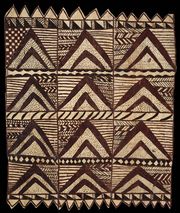Difference between revisions of "Bark paper"
Jump to navigation
Jump to search
| Line 1: | Line 1: | ||
| − | [[File:1976.482-SC120444.jpg|thumb| | + | [[File:1976.482-SC120444.jpg|thumb|Samoan fan<br>MFA#: 1976.482]] |
== Description == | == Description == | ||
[[File:Tapa 63185.jpg|thumb|Tapa cloth<br>MFA# 63.185]] | [[File:Tapa 63185.jpg|thumb|Tapa cloth<br>MFA# 63.185]] | ||
Latest revision as of 08:09, 14 August 2020
Description
Thin, flexible sheets obtained from the smooth, white, inner surface of tree bark usually from one of the following trees: Birch (genus Betula), paper mulberry (Broussonetia papyrifera), or Breadfruit (genus Artocarpus). Bark paper, also called bark cloth, has been used in many cultures. Polynesian bark cloth, called Tapa, is cut in thin strips from the inner bark of the breadfruit tree, then beat to form a thin flexible cloth. Amatl, made by the Aztecs and Huun, made by the Maya, are other types of cloth prepared by soaking then beating the bark sheets to form thin paper.
Synonyms and Related Terms
bark cloth, amatl; tapa; huun; tissu en fibre d'écorce (Fr.);amatle (Esp.)
Resources and Citations
- S. Turner, Which Paper?, 1981.
- Hermann Kuhn, Conservation and Restoration of Works of Art and Antiquities, Butterworths, London, 1986
- Silvie Turner, Which Paper?, Design Press, New York, 1991
- Art and Architecture Thesaurus Online, http://www.getty.edu/research/tools/vocabulary/aat/, J. Paul Getty Trust, Los Angeles, 2000

